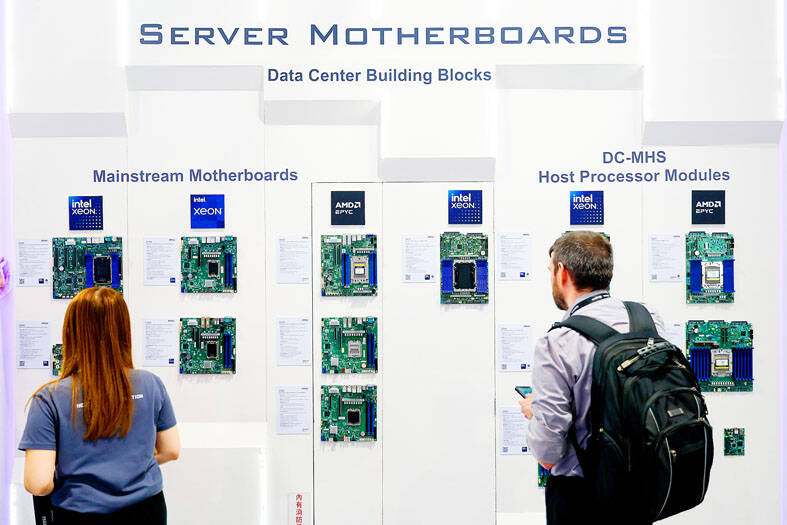The nation’s industrial production index rose 18.65 percent year-on-year to 111.48 last month, driven by strong demand for artificial intelligence (AI) servers and high-performance computing (HPC) applications, partially offset by weakness in traditional industries, the Ministry of Economic Affairs said yesterday.
The manufacturing production index, which comprises 94.63 percent of the industrial production index, increased 20.03 percent year-on-year to 112.11, marking the 16th consecutive month of growth, but missed the ministry’s forecast range of 115.4 to 119.4.
That lifted the industrial and manufacturing production indices by 21.44 percent and 22.84 percent year-on-year in the second quarter, the strongest growth since the second quarter of 2010, the ministry said.

Photo: Ritchie B. Tongo, EPA-EFE
In the first half of this year, the two indices rose 16.69 percent and 17.77 percent year-on-year respectively, hitting a record high for the period.
The manufacturing production index fell 7.24 percent last month from May, as manufacturers cited product transitions, portfolio changes and easing front-loading demand, although overall performance remained solid, Department of Statistics Director-General Huang Wei-jie (黃偉傑) told a news conference in Taipei.
The manufacturing production index this month is expected to rise 19.5 to 23.7 percent annually, the ministry said.
Electronic component production rose 22.38 percent year-on-year last month, driven by strong demand for AI and cloud data service applications, the ministry said.
The semiconductor production subindex increased 22.8 percent, thanks to robust demand for AI and HPC devices, boosting 12-inch wafer production, motherboard manufacturing, and chip design and testing.
Meanwhile, the subindex for flat panel and related components production rose 6.23 percent, extending growth from May, the ministry said.
Front-loading of medium-sized and small panels for industrial, automotive and medical use continued, boosting the monthly figure, Huang said.
Production of computers, electronic goods and optical components surged 81.95 percent, driven by strong AI demand, continued front-loading and camera upgrades by Japanese and South Korean smartphone makers, boosting output of servers, mobile cameras and industrial computers, the ministry said.
However, base metal production, mainly steel, fell 6.15 percent, while chemical materials and fertilizers dropped 1.94 percent, due to weak demand and oversupply from China, it said.
Machinery equipment production rose 6.3 percent, driven by demand for semiconductor production equipment.
Following US President Donald Trump’s announcement to cut tariffs on some Japanese goods to 15 from 25 percent, some upstream machinery equipment makers supplying components to Japan expressed optimism, expecting stronger Japanese output to boost their sales, Huang said, adding that the situation would remain unclear until more countries’ rates are finalized.
Vehicle output fell 3.38 percent year-on-year due to weak demand for gasoline-powered small sedans and trucks, although the decline narrowed from last month, supported by new hybrid vehicle launches, Huang said.

Taiwan Semiconductor Manufacturing Co (TSMC, 台積電), the world’s biggest contract chipmaker, booked its first-ever profit from its Arizona subsidiary in the first half of this year, four years after operations began, a company financial statement showed. Wholly owned by TSMC, the Arizona unit contributed NT$4.52 billion (US$150.1 million) in net profit, compared with a loss of NT$4.34 billion a year earlier, the statement showed. The company attributed the turnaround to strong market demand and high factory utilization. The Arizona unit counts Apple Inc, Nvidia Corp and Advanced Micro Devices Inc among its major customers. The firm’s first fab in Arizona began high-volume production

VOTE OF CONFIDENCE: The Japanese company is adding Intel to an investment portfolio that includes artificial intelligence linchpins Nvidia Corp and TSMC Softbank Group Corp agreed to buy US$2 billion of Intel Corp stock, a surprise deal to shore up a struggling US name while boosting its own chip ambitions. The Japanese company, which is adding Intel to an investment portfolio that includes artificial intelligence (AI) linchpins Nvidia Corp and Taiwan Semiconductor Manufacturing Co (TSMC, 台積電), is to pay US$23 a share — a small discount to Intel’s last close. Shares of the US chipmaker, which would issue new stock to Softbank, surged more than 5 percent in after-hours trading. Softbank’s stock fell as much as 5.4 percent on Tuesday in Tokyo, its

COLLABORATION: Softbank would supply manufacturing gear to the factory, and a joint venture would make AI data center equipment, Young Liu said Hon Hai Precision Industry Co (鴻海精密) would operate a US factory owned by Softbank Group Corp, setting up what is in the running to be the first manufacturing site in the Japanese company’s US$500 billion Stargate venture with OpenAI and Oracle Corp. Softbank is acquiring Hon Hai’s electric-vehicle plant in Ohio, but the Taiwanese company would continue to run the complex after turning it into an artificial intelligence (AI) server production plant, Hon Hai chairman Young Liu (劉揚偉) said yesterday. Softbank would supply manufacturing gear to the factory, and a joint venture between the two companies would make AI data

DOLLAR SIGNS: The central bank rejected claims that the NT dollar had appreciated 10 percentage points more than the yen or the won against the greenback The New Taiwan dollar yesterday fell for a sixth day to its weakest level in three months, driven by equity-related outflows and reactions to an economics official’s exchange rate remarks. The NT dollar slid NT$0.197, or 0.65 percent, to close at NT$30.505 per US dollar, central bank data showed. The local currency has depreciated 1.97 percent so far this month, ranking as the weakest performer among Asian currencies. Dealers attributed the retreat to foreign investors wiring capital gains and dividends abroad after taking profit in local shares. They also pointed to reports that Washington might consider taking equity stakes in chipmakers, including Taiwan Semiconductor